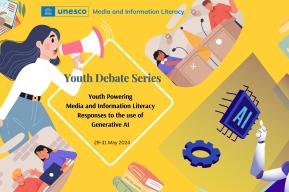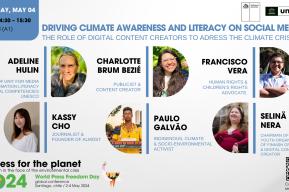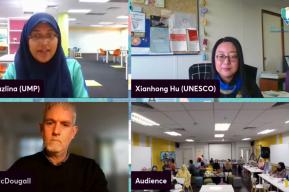Article
Transforming Education Pre-Summit: Media and Information Literacy and OER key to addressing today’s education challenges

The event highlighted education transformation and the role of multistakeholder partnerships in media and information literacy non-formal and/or informal learning, and expanding the UNESCO Media and Information Lliteracy (MIL) Alliance. Massification of open educational resources (OER) is another key to building inclusive knowledge societies and to the transformation of education in our digital age.
The Human Rights, Openness, Accessibility for all, Multistakeholder participation, and cross-cuting themes such as gender equality and online safety (ROAM-X) principles developed by UNESCO provide the basis for adequate preparedness to ride the wave of educational transformation.
We call not to reinvent the wheel but to build on the state of the art. The world is changing. We must change with it by transforming education. OER and digital skills are fundamental tools in this process. The time is now for widescale expansion of people’s access to MIL, and for the integration of related skills and attitudes into formal education, as well as into learning outside the classroom.
Three presentations from Greece, Mongolia and Nigeria highlighted the importance to reap the full benefits and to be adequately equipped to face the increasing digitalization leveraging Media and Information Literacy, OER and the ICT Competency Framework for Teachers (ICT CFT) for the creation of a strong information and knowledge societies.
Media and Information Literacy that started as a school of thought in academic settings over 30 years ago and transformed into a global movement thanks to UNESCO’s systematic efforts and its global leadership through UNESCO MIL Alliance on Promoting Media and Information Literacy for All.
The first session of the event, Global Media Partnerships on Media and Information Literacy: Transforming non-formal/informal education, focused on multistakeholder dialogue on partnerships to leverage the contributions of media to non-formal and/or informal learning.
Addressing the audience, Steve Ahern, the Head of ABU Media Academy, Asia-Pacific Broadcasting Union, highlighted the key role of the media in informing and educating societies in media and information literacy through news reports and other productions.
The expert speaker called on all stakeholders to mobilize, recognize the essential role of the media and information literacy and further integrate these life skills in transforming education processes.
Among the major points developed is to foster the creation of a global movement for education transformation, by building on existing innovative partnerships, networks and coalitions and adding new actors. In this regard, the OER Dynamic Coalition, the UNESCO OER Hub and the ICT CFT Expert and Practitioner Group were highlighted as best practices to be further enhanced.
The critical glue is that the ICT Competency Framework is a living transformative document and enables frameworks to actually grow and develop as the learning needs change.
The OER Dynamic Coalition session entitled Coalitions for Open Content and Teacher Training: Implementing the UNESCO OER Recommendation - Scaling up open education resources for education transformation showed the importance of open licensing as a significant enabler of access to educational resources and the impact of the ICT CFT Harnessing OER Project in enhancing the digital competencies of teachers in the digital age.
The event has resulted in the following conclusions and outcomes:
- a consensus that Media and Information Literacy and OER are information and digital public goods, and should therefore be key drivers in the knowledge sharing game;
- the commitment to transforming education through the massification of MIL and OER by offline and digital means will enable us to reap the full benefits of lifelong learning in a secure cyberspace;
- it is not necessary to reinvent the wheel but rather to build on the state of the art, using the available tools and networks, such as:
- OER Recommendation,
- OER Dynamic Coalition,
- UNESCO Global Standards for Media and Information Literacy Curricula Development Guidelines,
- Media and Information Literate Citizens: Think Critically, Click Wisely,
- Media and Information Literacy in Journalism,
- ICT CFT OER online platform.
The event delivered a strong message for the negotiators of the Transforming Education Summit: media and information literacy and open content are information and digital public goods, and UNESCO is a forerunner and pioneer in these fields through standard setting MIL resources, United Nations General Assembly Resolution A/RES/75/267 and the OER Recommendation. The next step will be to bring this message to the upcoming Transforming Education Summit in September 2022 at the United Nation General Assembly.







